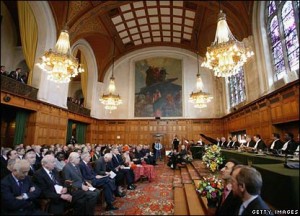The ICJ is the principal judicial organ of the UN. The seat of the Court is the Peace Palace of The Hague (Netherlands) while the other five organs of the UN are all located in NY. 1st case May 1947. From May 1947 to January 2010 – 146 cases were entered into. Sample disputes they have dealt with: maritime boundaries, the non-use of force, diplomatic relations, hostage taking, the right of asylum, nationality, rights of passage and economic rights.
Purpose:
- 1. To settle, in accordance with international law, legal disputes submitted to it by States (contentious cases) ie. Cameroon v. Nigeria

- 2. Give advisory opinions on legal questions referred to it by duly notarized UN organs and specialized agencies ie. Indonesia/Malaysia 15 judges who are elected for terms of office of 9 years by the UN General Assembly and the Security Council. English and French are the official languages. The judges must be jurists of recognized competency and it may not include more than one judge of any nationality. The members of the Court do not represent their governments but are independent magistrates.
- 192 members in the UN are eligible to appear before the Court in contentious cases.
- The Court has no jurisdiction to deal with applications from individuals, non-governmental organizations, corporations or any other private entity. It cannot provide them with legal counselling or help them in their dealings with the authorities of any State whatsoever.
However, a State may take up the case of one of its nationals and invoke against another State the wrongs which its national claims to have suffered at the hands of the latter; the dispute then becomes one between States.
- The International Court of Justice has no jurisdiction to try individuals accused of war crimes or crimes against humanity. As it is not a criminal court, it does not have a prosecutor able to initiate proceedings. This task is the preserve of national courts, the ad hoc criminal tribunals established by the UN such as:
- the International Criminal Tribunal for the former Yugoslavia
- the International Criminal Tribunal for Rwanda
- Special Court for Sierre Leona
- International Criminal Court
The Court is not a Supreme Court to which national courts can turn; it does not act as a court of last resort for individuals. Nor is it an appeal court for any international tribunal.
The Court can only hear a dispute when requested to do so by one or more States. It is not permitted to investigate and rule on acts of sovereign States as it chooses.
The judges deliberate in private and then deliver their judgment at a public sitting. Judgements delivered by the Court are binding. Final and without appeal. Should one of the States involved fail to comply with it, the other party may have recourse to the Security Council of the United Nations.
Hearings are public unless hearing is closed. Media reps must be accredited. There are guided tours during weekdays. There is a charge. There are no tours during hearings.
How do you know a case is international?
ie. US vs Iran (2 countries involved)
ie. United States v. Ng ICJ (court is named in the citation)
ie. Britain’s House of Lords v. Pinochet (International law stated)
